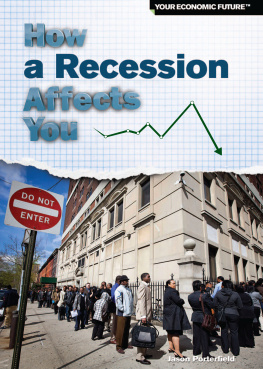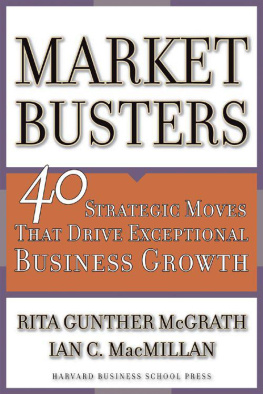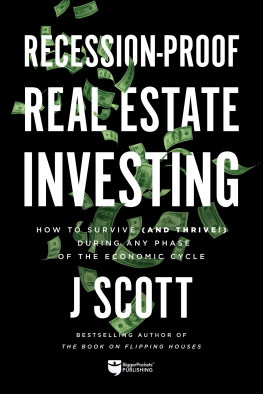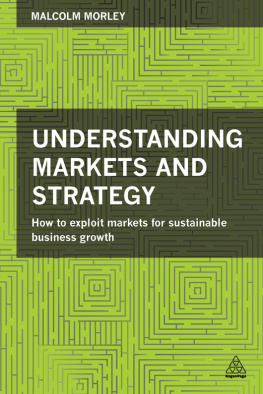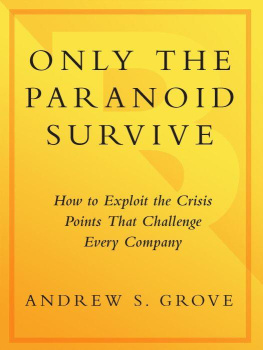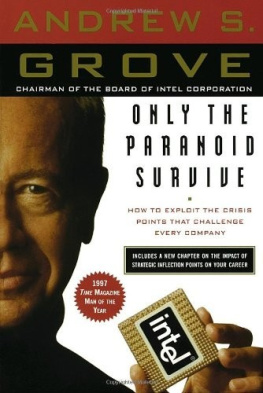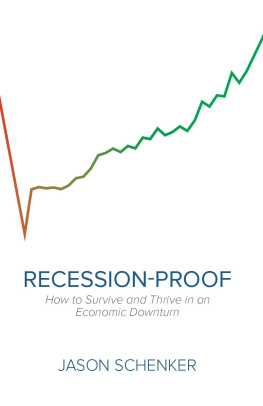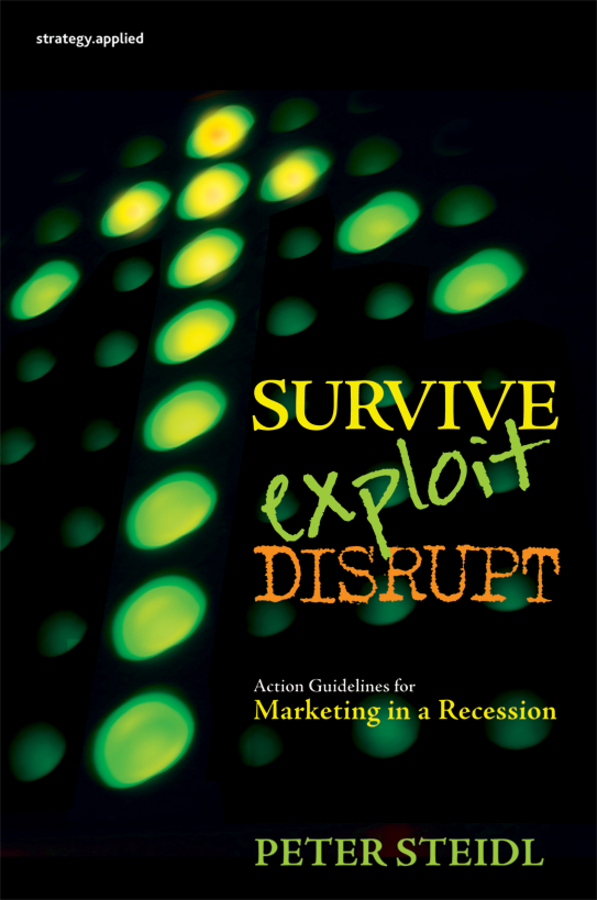Contents

First published 2009 by
John Wiley & Sons Australia, Ltd
42 McDougall Street, Milton Qld 4064
Office also in Melbourne
Typeset in Adobe Caslon Pro 11.5/14.5pt
Peter Steidl 2009
The moral rights of the author have been asserted
National Library of Australia Cataloguing-in-Publication entry:
Author: Steidl, Peter.
Title: Survive, exploit, disrupt: action guidelines for marketing in a recession / Peter Steidl.
ISBN: 9781742169378 (pbk.)
Notes: Includes index.
Subjects: Marketing Management.
Recessions.
Success in business.
Dewey number: 658.8
All rights reserved. Except as permitted under the Australian Copyright Act 1968 (for example, a fair dealing for the purposes of study, research, criticism or review), no part of this book may be reproduced, stored in a retrieval system, communicated or transmitted in any form or by any means without prior written permission. All inquiries should be made to the publisher at the address above.
Cover image Jose Luis Alves, 2009. Used under license from Shutterstock.com
Disclaimer
The material in this publication is of the nature of general comment only, and does not represent professional advice. It is not intended to provide specific guidance for particular circumstances and it should not be relied on as the basis for any decision to take action or not take action on any matter which it covers. Readers should obtain professional advice where appropriate, before making any such decision. To the maximum extent permitted by law, the author and publisher disclaim all responsibility and liability to any person, arising directly or indirectly from any person taking or not taking action based upon the information in this publication.
Acknowledgements
In management time is of the essence and this principle certainly applies to writing, editing and publishing a book that deals with a recessionary period.
As with so many things in life, the project came about almost by accident. As the recession became a reality in many countries around the world we at Mindshare discussed publishing a series of books that would address high-interest topics, exploring fresh thinking and new practices. Our focus had been on the revitalisation of mature brands, a topic of great interest to many companies. With the recession becoming the foremost concern of senior executives, our focus shifted to this challenge and, more specifically, to what companies could do not only to survive, but capitalise on the massive change such a period brings.
Then a rapid succession of events took place that led to this book: John Wiley & Sons became our publisher; Raja Kanniappan, Group Ms CFO Asia-Pacific, accepted the chairmanship of the editorial board; Mindshare allowed me to spend four weeks focusing entirely on writing; and a number of individuals contributed in a variety of ways.
I would like to acknowledge with gratitude Vija Blumbergs who has tirelessly reviewed early drafts and provided advice on structure and focus, while also eliminating the many Austrianisms I still manage to embed in my writing. Professor Peter McDonald, Managing Director of the Agency Register, provided a number of specific suggestions that contributed to shaping the final product. My colleague Valerie Lim provided the Dove case example used in the section on icon brands.
Raja deserves a big thank you for making time to support this initiative when, at the same time, he has to deal with a multitude of developments in the AsiaPacific region that demand his full attention. John Petropoulos and Mark McCraith, both senior Mindshare executives, allowed me to dedicate time to write this book and I am grateful for the opportunity to do so. And, importantly, I want to thank my publisher, Katherine Drew, who championed the project, and the rest of the team at John Wiley & Sons.
It is of particular satisfaction to serve as the first author in the new Mindshare Strategy. Applied series, published by John Wiley & Sons. Management is about managing change and given the rapidly changing environment, many executives find that short-term, quarterly results and day-to-day challenges absorb so much of their day that it is difficult to set time aside to think about broader, strategic issues. The Mindshare Strategy. Applied series aims to provide management with easy-to-read, focused advice addressing some of the major challenges they face. This book is an attempt to deliver on this promise. I hope I have succeeded and thank all those who have helped me on the way.
Dr Peter Steidl
February 2009
A philosophical introduction to a hard-edged topic
This is the joy of management: your relentless efforts, your decisions and the guidance you give to others can create a shared spirit, enjoyment, belonging, satisfaction and wealth. Management is not about the status quo. It is about creation and creative destruction. As such, it can be said to be an instrument of evolution not in the elegant and unknowable yet seemingly purposeful way nature exercises evolution, but in the clumsy and yet strangely satisfying way we try to realise the imperfect constructions conceived by our limited minds: processes, systems, tools, ideas, inventions, technologies, all brought together in what we call businesses and economies.
Then a recession strikes.
In all likelihood we have caused it because, the truth be told, we actually have no idea how our fantastic constructions from global financial markets to economic treaties really work. The recession blows through and demolishes our house of cards, weeding out some of our excesses, bad ideas and silly concepts. By doing so, it makes room for new developments, new ideas to grow and gather pace, new leaders, new experiences and, undoubtedly, more of these wonderfully inadequate concepts and constructions we dont actually understand, laying a solid foundation for another recession to visit before too long.
It follows that a recession is not a time to feel sorry for ourselves. It is not a time to turn inward, to let frustration rise or the joy of management die. It is simply a period that will test executives and policy makers, governments and even the average person on the street (if he or she really exists). In fact, for many executives a recession is the most significant challenge they will experience during their professional life. Lets face it, it is not that difficult to manage during periods of growth, when poor decisions and inefficiencies are masked by growing revenue pools. But a recession a different story altogether!
As always in life, some will be natural winners because they have found a career in an industry that will benefit from a recession or, by mere chance, have taken actions that will see them well prepared going into a recessionary period. But many will feel the pressure of a seemingly shrinking world that renders useless the grand strategies that looked so promising apparently only yesterday. Day-to-day emergencies start to consume the executive and relentless change in the operating environment demands attention until exhaustion extinguishes any further thought.
Few have foreseen this recession and taken appropriate actions. Those who did are assured of our total admiration. Most saw some of the early signs, but were nevertheless caught unprepared for the massive changes we saw play out at the end of 2008. This is a global event and it is already affecting most industry sectors. Few companies will escape the impact of what is rattling towards us, moving faster than a freight train.


